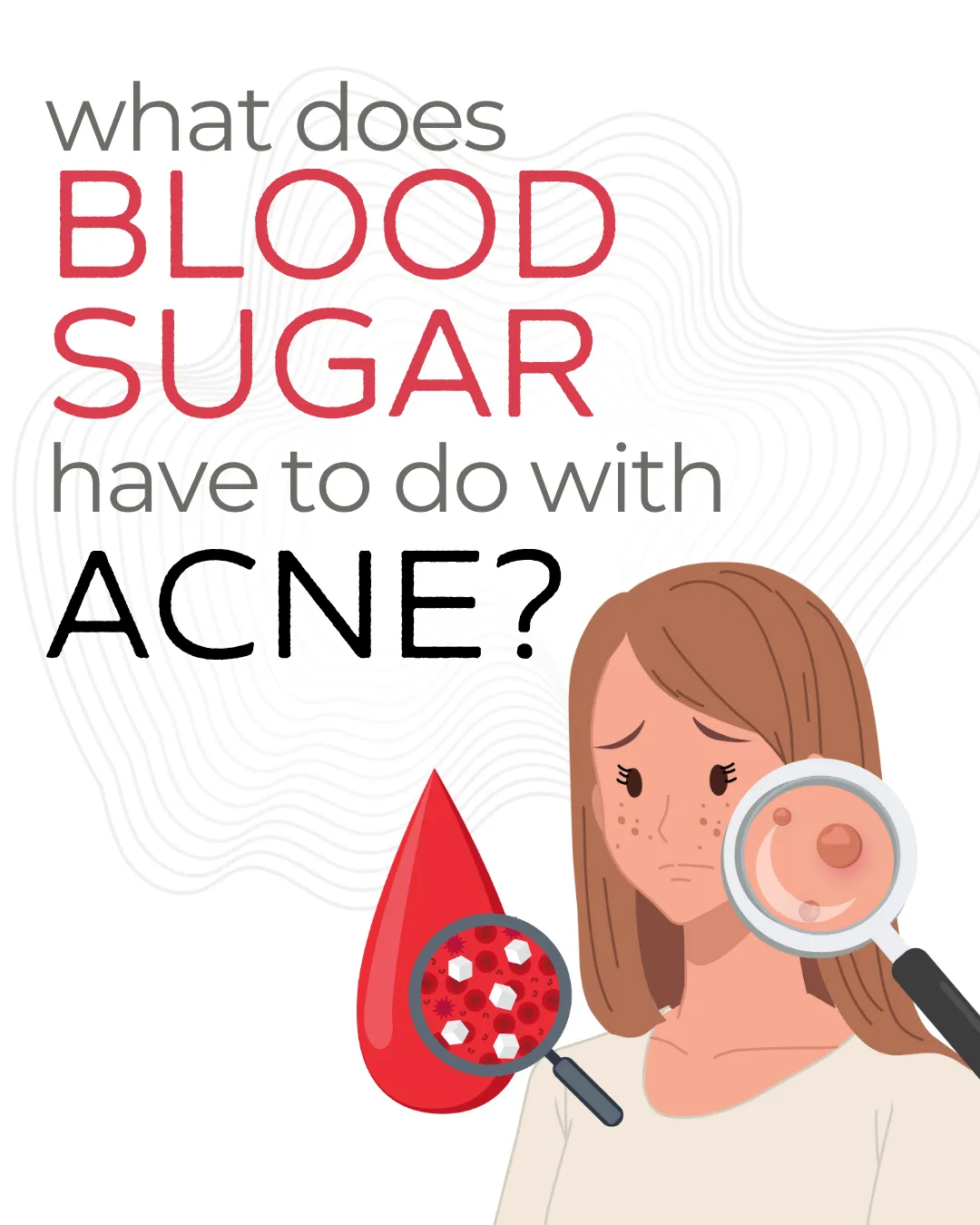
Tackling Acne by Balancing Blood Sugar and Hormones

Have you ever wondered why your skin rebels after a weekend of pizza, soda, and sweets? Or why acne sticks around no matter how carefully you wash and moisturize? Acne isn’t just a skin problem—it often starts deeper, linked to how your body manages blood sugar and insulin.
If persistent acne is holding you back, it might be time to look beyond your skincare routine and explore what’s happening inside your body.
What’s the Connection Between Blood Sugar and Acne?
Eating high-glycemic foods like white bread, pastries, candy, or sugary drinks causes a quick rise in blood sugar. Your body responds by releasing insulin to move that sugar into your cells. While this is normal, frequent or dramatic spikes can trigger a chain reaction that impacts your hormones and skin.
Elevated insulin increases insulin-like growth factor 1 (IGF-1) — a hormone that boosts oil (sebum) production and speeds up skin cell growth inside your pores. High insulin also lowers sex hormone-binding globulin (SHBG), leading to more free hormones like testosterone circulating in your body — which increases oil production even more.
This combo creates an environment where pores clog, bacteria multiply, and inflammation rises — resulting in breakouts.
Why Does This Matter for You?
If acne is linked to what’s on your plate, you have real power to make a difference. While diet isn’t the only cause — genetics, stress, gut health, and skincare also play roles — addressing blood sugar swings can lead to clearer skin and better overall health.
Signs Blood Sugar Could Be Contributing to Your Acne
Fatigue after meals
Strong sugar cravings
Increased belly fat
Mood swings when hungry
Lab tests that can shed light include:
Fasting glucose & insulin
Hemoglobin A1c (average blood sugar over months)
HOMA-IR (insulin resistance marker)
IGF-1 and SHBG (hormone interaction indicators)
These labs offer a clearer picture than blood sugar alone.
What Can You Do to Balance Blood Sugar and Clear Acne?
1. Focus on Low-Glycemic Foods
Choose colorful veggies, leafy greens, whole grains (quinoa, barley), lean proteins, and healthy fats to keep blood sugar steady. Simple swaps like berries instead of candy or sweet potatoes instead of white potatoes help too.
2. Watch Your Dairy Intake
For some, dairy—especially skim milk—can raise insulin. It’s worth exploring if acne persists despite other changes.
3. Add Healthy Fats & Anti-Inflammatory Foods
Omega-3 fats from salmon, sardines, walnuts, and flaxseeds calm inflammation, including in your skin. A Mediterranean-style diet rich in these fats plus olive oil and herbs supports better skin health.
4. Mind Your Lifestyle
Regular movement improves insulin sensitivity. Good sleep and stress management lower cortisol, preventing blood sugar swings and inflammation. Staying hydrated supports liver and skin detoxification.
Are Supplements Helpful for Acne and Insulin Regulation?
Some nutrients can support insulin balance and healthy skin. Under healthcare guidance, zinc (reduces oil + inflammation), omega-3 supplements, chromium, berberine (for insulin resistance), and probiotics (for gut-skin axis) can be helpful.
Acne is More Than Skin Deep
Often, acne signals that your body struggles to keep blood sugar, insulin, and hormones balanced. By looking at labs, nutrition, lifestyle, and supplements, you can address root causes and support clearer skin from the inside out.
More importantly, these changes help your whole body thrive.
Ready to Clear Your Skin and Balance Your Health?
If you’re ready to explore what’s driving your acne, I can create a personalized plan just for you!
👉 Book your free 15-minute consult here: https://beetrueintegrativemedicine.com/book
References
Meixiong J, Ricco C, Vasavda C, Ho BK. Diet and acne: A systematic review. JAAD Int. 2022 Mar 29;7:95-112. doi: 10.1016/j.jdin.2022.02.012. PMID: 35373155; PMCID: PMC8971946.
Smith RN, Mann NJ, Braue A, Mäkeläinen H, Varigos GA. A low-glycemic-load diet improves symptoms in acne vulgaris patients: a randomized controlled trial. Am J Clin Nutr. 2007 Jul;86(1):107-15. doi: 10.1093/ajcn/86.1.107. PMID: 17616769.
Mahmood SN, Bowe WP. Diet and acne update: carbohydrates emerge as the main culprit. J Drugs Dermatol. 2014 Apr;13(4):428-35. PMID: 24719062.
Raza Q, Hina R, Nawaz S, et al. (November 02, 2024) Effect of a Low-Glycemic-Load Diet and Dietary Counseling on Acne Vulgaris Severity Among Female Patients Aged 15 to 35 Years. Cureus 16(11): e72886. doi:10.7759/cureus.72886
Guertler A, Neu K, Lill D, et al. Exploring the potential of omega-3 fatty acids in acne patients: A prospective intervention study. J Cosmet Dermatol. 2024 Jul 10. doi: 10.1111/jocd.16434. Epub ahead of print. PMID: 38982829.
Can omega-3 fatty acid intake affect acne severity? News Release. Wiley. July 10, 2024. Accessed July 15, 2024. https://www.eurekalert.org/news-releases/1050496
